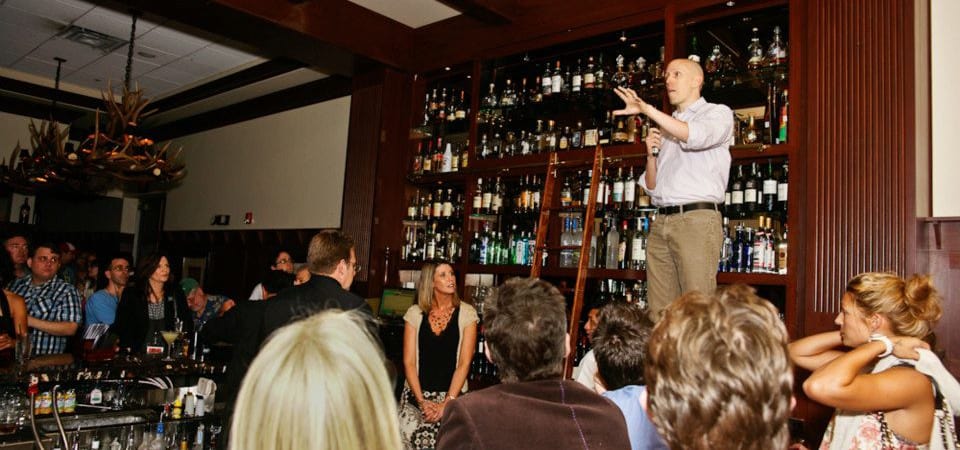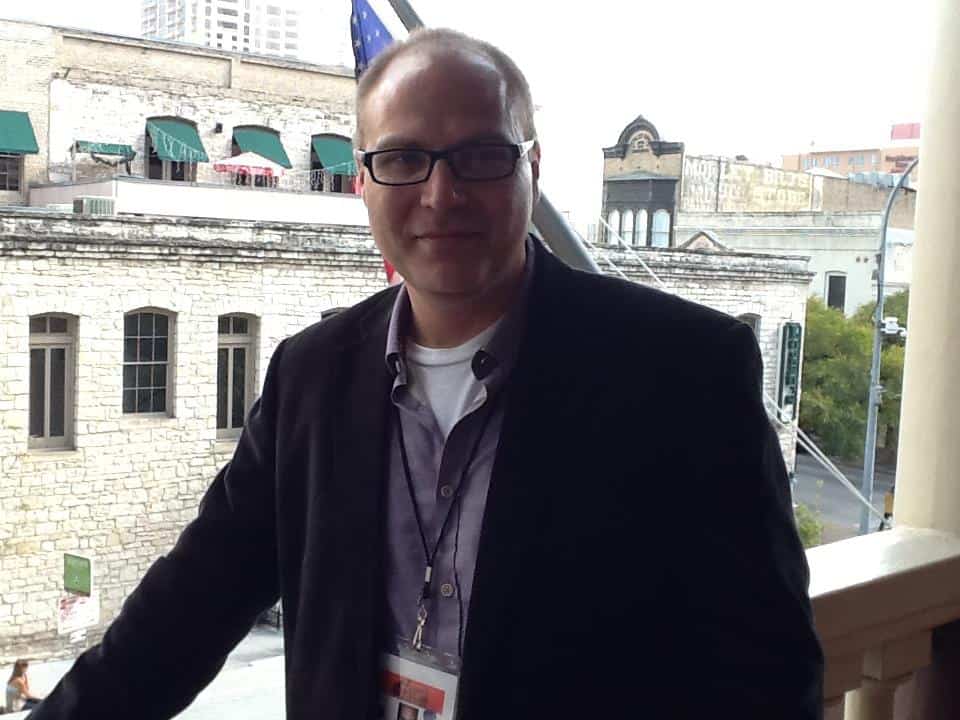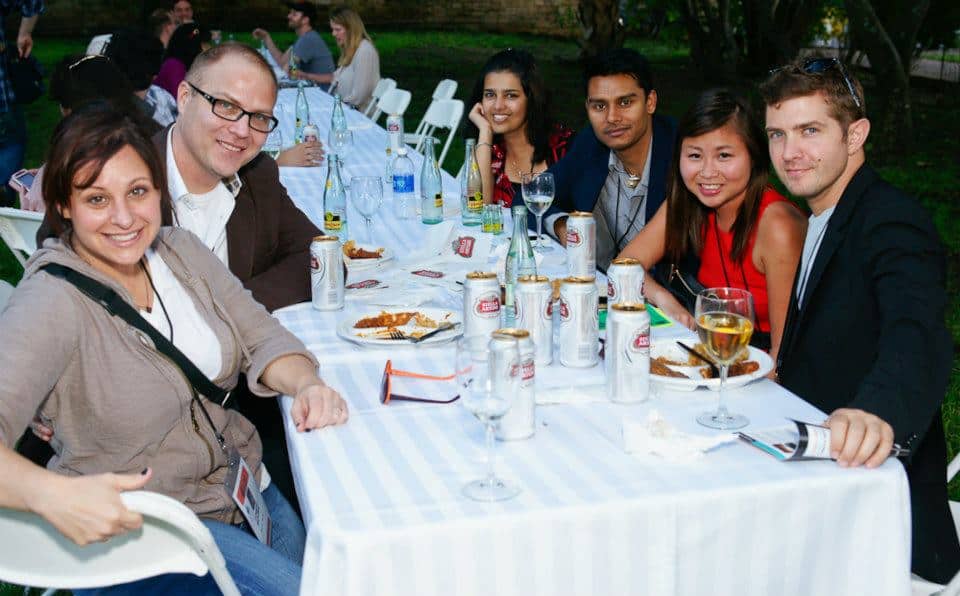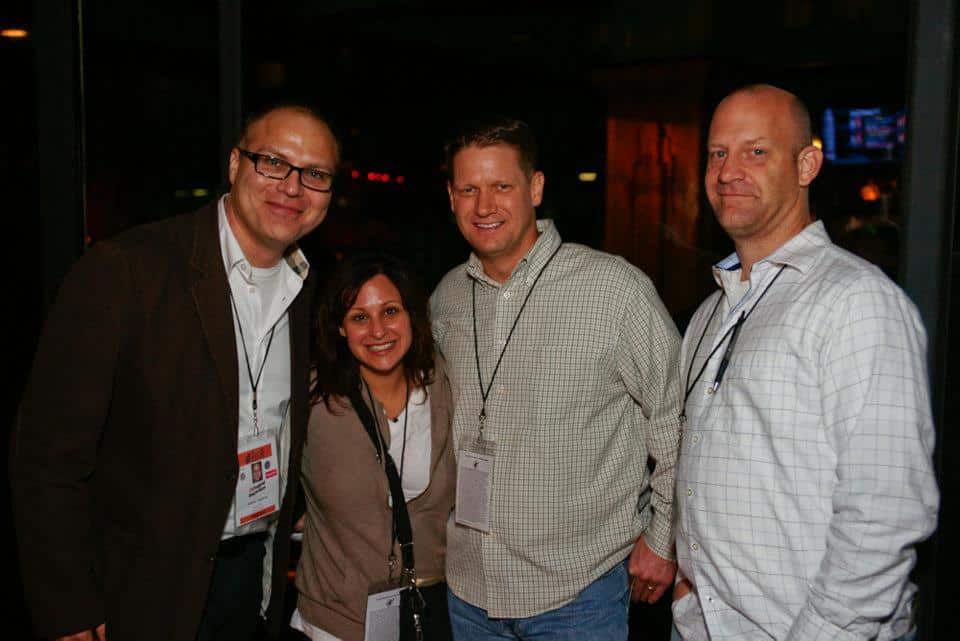
This year’s Austin Film Festival had over 6,500 unproduced screenplays entered into the script competition. 10% of them made it to the second round. That’s roughly 650 writers who get that honor and almost 5,000 who didn’t. From there, 96 scripts were semi-finalists and from that shallow pool you get the finalists – five scripts in the comedy category and six for drama.
While having a beer at one of the events I ran into Scott Larson, a writer from Chicago. Turns out he was one of the select few to be able to call themselves finalists in the drama category. His script ‘Cumberland’ was based on the true story of the most lopsided game in college football history. In October of 1916 the Cumberland Bulldogs faced the Georgia Tech Engineers. The Cumberland football program had been discontinued for that season, but were forced to play the game anyway. The Georgia Tech Engineers gave them a beating, winning the game 222 to 0.
That’s two hundred and twenty two points for one team, and a desolate zero for the Cumberland Bulldogs. In a game of football, where each inch of field is sweated and bled over.
Yeah. It was pretty brutal.
I asked Scott if he’d be up for sharing his experience at the festival and his writing process with me. The gentleman that he is, he agreed.
At the Austin Film Festival you mentioned that you work in advertising in Chicago. What’s your workday like? Does your job act as any sort of creative outlet?
Advertising does act as a creative outlet, which is why I was originally attracted to the field. As a writer you basically get to come up with jokes or mini-stories all day and then go produce them. The good side is, you get a lot of experience casting, shooting, editing and scoring music. The bad side is, it sometimes doesn’t leave you with much creative energy left over to write screenplays.
Having spent a few years in advertising I know the hours can be pretty long. Outside of your regular job, what’s your day like? How do you balance your writing, friends, and family?
Like with any job, it can be a trick. You have to protect your writing time. I work best when I have specific goals and a writing schedule. But there are certainly sacrifices. My golf game isn’t getting any better.
Your script ‘CUMBERLAND’ is based on the true story of the most lopsided game in college football history. What made you choose this as a subject?
I originally stumbled across it as one of those ‘fun sports facts’ in a newspaper or magazine. Once I began researching it, I realized the story was much more than just an amusing piece of sports trivia. The story had everything you could possibly want: lying, cheating, stealing, revenge and redemption. Not to mention John Heisman.
I know true stories have a tendency to get more attention — did you take that into consideration before you started writing? How concerned were you with writing something that would appeal to a large audience?
I did to a certain degree. If I was going to write a sports movie, I felt it was a lot more satisfying for it to be a true story. My favorite sports movies tend to be ones based on real people and real events. As far as audience appeal goes, I knew from the very beginning I was going out on a bit of a limb. This wasn’t your typical underdog sports movie you’ve seen a hundred times before. This was something different. I wanted to approach it as a ‘sports disaster’ movie and show how this extraordinary contest affected and changed the characters involved.
It definitely doesn’t follow the same tropes you see in sports films. How long have been writing scripts? What sort of history do you have with it?
I first began dabbling in screenwriting about 9 or 10 years ago. I have written a number of scripts in the past, including an earlier iteration of this one, but a few years ago I decided I wanted a fresh start. I scrapped everything I had written before and focused on improving my craft and writing the types of stories I really wanted to write.
You’ve put a lot of effort into screenwriting – do you also write fiction? Have you attempted a novel at some point? I always consider it because there’s an actual end product that you can give to people. “Here’s my book. It exists.”
I do have a book project that I’ve been noodling around with for a few years now. It’s a bit ambitious in scope so I have put off taking it on, but I will certainly write it eventually. It is something that probably wouldn’t work as well as a screenplay because, as you suggested, a book is a self-contained experience. I’m actually really excited about writing it, but don’t want to dive in until I am completely ready.
Was the Austin Film Festival the first screenplay competition you’ve entered? What other outlets are you sending your writing to? Do you send query letters to agents or any of that?
No, the Austin Film Festival was not the first. I have entered a number of contests and have had scripts place as a quarter-finalist for the Nicholl Fellowship and Final Draft Big Break Contest. I do plan on sending out some query letters and exploring a few other avenues, but I am primarily focused on writing my next script.
Damn, you placed well in a lot of excellent competitions. I don’t know if this question is uncouth or not, but, do you think any of them have helped you get closer to turning writing into a career? Would it be different if you had won or were in LA?
It’s too early to tell. I look at screenwriting competitions as a piece of the puzzle, but certainly not the only piece. Living in LA would obviously be an advantage. You have to look at it from the perspective of the person who wants to hire you, take you on as a client, or option your screenplay. What is going to make them think you’d be a good investment or their time and money? But it all comes back to writing. If you write things that are great, everything else gets easier. So that is where most of the attention goes.
If your script hadn’t been a finalist in the Austin Film Festival do you think you still would have made the effort to go?
Yes, I had already made the decision to attend the festival when I got the news that my script was a finalist. Next year the decision will be even easier. The festival far exceeded my expectations. I can’t wait for next year’s trip and I couldn’t recommend it more to other writers.
You were invited to a handful of different events because your script was a finalist. Do you think the festival will help you be a better writer? Is it possible that it could lead to a career?
I think the festival provided motivation more than anything else. Writing can be a very isolated process and spending time with other writers and people in the industry is a great kick in the ass. The festival could certainly help launch a career in screenwriting, but it is up to me to make the most of the experience.
What would it take to get you to move to Los Angeles? Have you and your wife ever discussed that as an option?
It wouldn’t take much. I would move to LA in a heartbeat if I could justify quitting my job and making the move. I just need to be confident I could make a living through screenwriting. Not to mention, I have endured enough Chicago winters. The California sun and sand would make for a welcome change.
When I think about screenwriting and what it is we are actually doing it can be like staring into the darkness – sitting alone to write stories in a format not meant to be read for enjoyment AND there’s very little chance we’ll ever make money doing it. What motivates you to keep at it? How concerned are you with making it your career?
I just always need to have some sort of creative outlet in my life. When I was younger, I was in a rock and roll band where my creative outlet was writing music. Then I cut my hair and started a career in advertising where I actually made money being creative. Now my passion comes from writing screenplays. I would love to make it a career, but it wouldn’t kill me if it didn’t happen.
Any plans to shoot one of your scripts yourself?
No plans, but I would love to. I’d want to write something that was relatively easy to shoot. A historical sports movie that involves a football game played back in 1916 probably wouldn’t fall under that category. Something with a small cast and only a few locations. The script I am writing now would be much more realistic. I would also love to write and produce a play someday.
__________________________________________________________________________
Big thanks to Scott Larson for playing along with this interview. I feel it could have gone on a lot longer, but held back a bit. Shoot. We didn’t even go into his rock and roll phase.
If you have any questions for Scott put ’em in the comments section and I’ll make sure he gets them. Now, stop reading and get inspired to go and make something.
Yeah, you! Go create damn it!
Just kidding. Please. Keep reading. How about this?



Nice interview, Chris! Great to read about Scott’s Austin experience.
Thanks, Eilis!